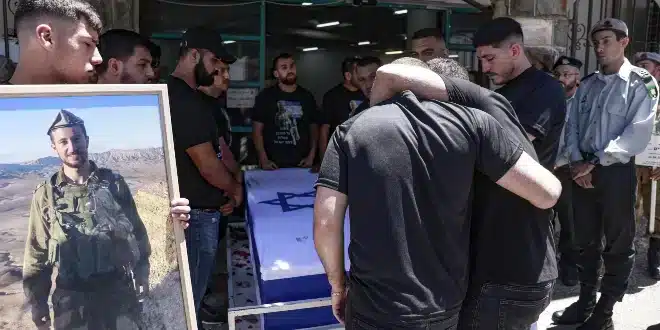Gaza experienced its first day of relative calm in months on Sunday after Israel’s military announced a daily “pause” in fighting around a southern route to facilitate aid deliveries, following repeated U.N. warnings of famine in the Palestinian territory.
Mahmud Basal, spokesman for the civil defense agency in Hamas-ruled Gaza, told AFP that the first day of Eid al-Adha was “considered near calm,” except for “some targeting” in Gaza City’s Shujaiya and Zeitun areas, and Israeli artillery fire in Rafah.
AFP correspondents in Gaza’s north and center reported no fighting on Sunday morning, though some shelling and at least one strike were reported in Rafah and central Gaza in the early evening. Images from the Bureij refugee camp showed children among the wounded and killed from an airstrike, with medics attempting resuscitation as ambulances arrived at a hospital in Deir al-Balah city.
The Israeli military emphasized that there was “no cessation of hostilities in the southern Gaza Strip,” and reported that one soldier died Sunday during fighting in the south.
The announcement of a “local, tactical pause of military activity” during daylight hours in an area of Rafah came a day after eight Israeli soldiers were killed in a blast near Rafah and three more died elsewhere, marking one of the heaviest losses for the army in the ongoing conflict with Hamas militants.
“Since this morning, we’ve felt a sudden calm with no gunfire or bombings… It’s strange,” said Haitham al-Ghura, 30, from Gaza City.
The United Nations welcomed the Israeli move, though Jens Laerke, spokesman for the U.N. humanitarian agency OCHA, noted that it had “yet to translate into more aid reaching people in need,” and called for “further concrete measures by Israel to address longstanding issues” on aid needs. Gazans urgently require food, water, sanitation, shelter, and healthcare, with many living near piles of solid waste, increasing health risks.
The pause, intended to facilitate aid delivery, will occur from 8:00 am to 7:00 pm daily along the road from the Kerem Shalom crossing to the Salah al-Din road and northwards, according to a military statement. A map released by the army showed the declared humanitarian route extending to Rafah’s European Hospital, about six miles from Kerem Shalom.
The announcement coincided with Eid al-Adha, but celebrations were muted. “We don’t have the joy we usually have” for Eid, said Umm Muhammad al-Katri in northern Gaza’s Jabalia refugee camp, mourning the loss of her son.
The military’s pause was part of efforts to “increase the volumes of humanitarian aid” following discussions with the United Nations and other organizations.
The eight soldiers killed Saturday were hit by an explosion while traveling in an armored vehicle near Rafah, where troops were engaged in fierce street battles against Palestinian militants. Major General Yaron Finkelman, Israel’s southern military commander, told troops they are “degrading” Hamas’s brigade in Rafah and will continue until it is defeated.
Abu Obaida, spokesman for Hamas’s military wing, vowed to “continue our painful strikes against the enemy wherever it may be.”
The latest fatalities brought the Israeli military’s death toll to 310 since the ground offensive began on October 27.
Israeli Prime Minister Benjamin Netanyahu offered condolences following “this terrible loss” and emphasized the need to “cling to the goals of the war” despite the heavy toll.
Israel has vowed to destroy Hamas following the group’s unprecedented October 7 attack, which Israel says resulted in the deaths of 1,194 people and the seizure of 251 hostages, of whom 116 remain in Gaza.
Israel’s retaliatory offensive has killed at least 37,337 people in Gaza, mostly civilians. The latest toll includes at least 41 deaths over the previous 24 hours.
Efforts by Egyptian, Qatari, and U.S. mediators to establish a new Gaza truce have so far been unsuccessful. The only previous truce lasted one week in November and resulted in the release of hostages in exchange for Palestinian prisoners, while increased aid flowed into Gaza.
Hamas has demanded the complete withdrawal of Israeli forces from Gaza and a permanent ceasefire—demands Israel has repeatedly rejected.
Israel’s hardline National Security Minister Itamar Ben Gvir criticized the humanitarian pause, calling it a “crazy and delusional approach.”
In early November, the United States said Israel had agreed to four-hour humanitarian pauses. One such pause occurred on December 14, according to COGAT, the Israeli defense ministry body responsible for Palestinian civilian affairs.


